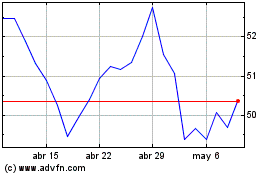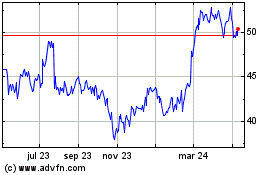By Sebastian Herrera and Allison Pran
EBay Inc. Chief Executive Devin Wenig has left the online
marketplace citing conflicts with the company's new board, which is
overseeing a strategic review of the business.
The San Jose, Calif., company has been evaluating its business
since March after activist investors Elliott Management Corp. and
Starboard Value LP had criticized the company's performance and
called for breaking it up. The company, which has been searching
for growth in light of steep online retail competition, has said it
plans to share the results from that review this fall.
Mr. Wenig, who is also stepping down as a board director, served
as CEO for more than four years. He joined the firm in 2011 as
president over its marketplace, which generates the bulk of eBay's
revenue.
"In the past few weeks it became clear that I was not on the
same page as my new Board," Mr. Wenig tweeted from his personal
account Wednesday. "Whenever that happens, its [sic] best for
everyone to turn that page over."
EBay declined to comment about Mr. Wenig's statements.
"Notwithstanding this progress, given a number of
considerations, both Devin and the board believe that a new CEO is
best for the company at this time," Chairman Thomas Tierney said in
a statement.
EBay said Chief Financial Officer Scott Schenkel will serve as
CEO on an interim basis while it conducts a search for a successor,
adding that it will consider internal and external candidates. Andy
Cring, currently vice president of global financial planning and
analysis, will serve as interim finance chief.
Shares in eBay fell 1.7% in Wednesday trading. The stock has
gained about 39% this year.
Earlier this year, eBay agreed to add three new board members
after reaching agreements with big hedge funds Starboard and
Elliott. So far eBay has added two new directors, including Jesse
Cohn, who runs Elliott's U.S. equity activism.
Elliott and Starboard had pressured the online marketplace
company to rid itself of StubHub. Elliott had also said eBay should
unload its classified advertising business.
Mr. Wenig became eBay's CEO after the company spun off PayPal in
2015, which it had purchased in 2002 for roughly $1.5 billion --
one of the biggest tech deals at the time. The rationale for the
split was that it would allow both companies greater flexibility in
their respective industries, eBay in online retail and PayPal in a
rapidly evolving payments industry. Currently, PayPay Holdings Inc.
carries a stock market value of more than $120 billion, while
eBay's is more than $32 billion, the latter being little changed
since the spinoff.
Pierre Omidyar led eBay from its founding in 1995 through 1997.
Meg Whitman, who steered the company through its 1998 initial
public offering, left the company in 2008. Its next CEO, John
Donahoe, ran eBay from then until 2015.
Mr. Wenig has faced difficulties in growing the company from its
roots as an online auction into more of a true marketplace. EBay
has tried to attract younger customers and worked to get brands to
sell more of their products through the company's e-commerce
platform.
EBay's annual revenue has grown in each year after the PayPal
sale, totaling $10.75 billion last year.
Mr. Wenig's departure also follows a string of other high-level
exits from eBay over the past year or so, including chief
technology officer Steve Fisher, who left in May, and chief product
officer RJ Pittman, who left in 2018.
Beginning in late 2018, eBay began making drastic changes to its
managed-payment systems, allowing sellers to manage their selling,
payments and other services within one account and accepting
different forms of payment. It has been altering its advertisement
business. And it recently shut down its third-party ad network that
let merchants advertise on other sites to focus on promoted
listings on its own site
While eBay has said its new initiatives could bolster the
business, it hasn't seen enough growth to offset problems
elsewhere. EBay's revenue growth has been slowing, rising just 2%
in its most recent quarter from the prior year, as the value of
goods sold on its site has declined, falling another 4% in the
quarter to $22.6 billion.
Once an online juggernaut, eBay hasn't been able to compete with
its much larger rival Amazon.com Inc., which commands about 38% of
U.S. online retail sales, according to eMarketer, while eBay has
just a 6% share.
Unlike Amazon, which has built warehouses throughout the
country, a third-party seller network and built up its own brands,
eBay's revenue relies heavily on transaction fees, and it hasn't
grown its own distribution network. In July, eBay launched a
fulfillment service, but only for its biggest sellers.
"They did not have people who had a lot of experience in
e-commerce or who knew e-commerce in the early years," a former
eBay board member said. "Devin has been more of an operations guy
than an innovator."
Write to Sebastian Herrera at Sebastian.Herrera@wsj.com
(END) Dow Jones Newswires
September 25, 2019 12:17 ET (16:17 GMT)
Copyright (c) 2019 Dow Jones & Company, Inc.
eBay (NASDAQ:EBAY)
Gráfica de Acción Histórica
De Mar 2024 a Abr 2024

eBay (NASDAQ:EBAY)
Gráfica de Acción Histórica
De Abr 2023 a Abr 2024
